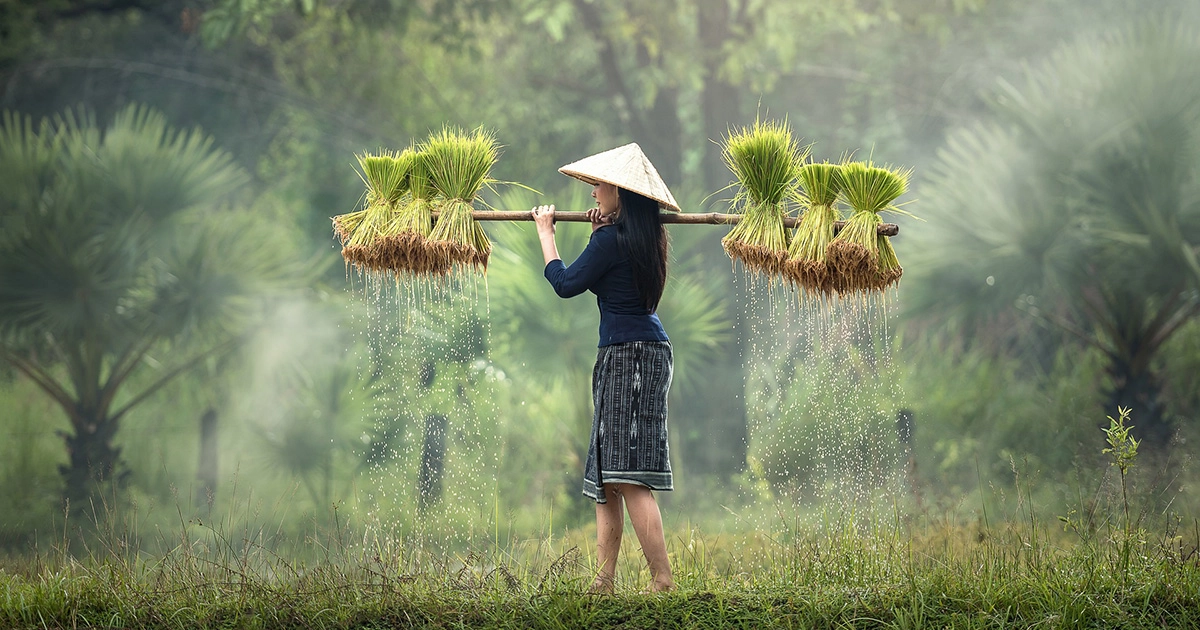Vietnam
 Table of contents
Table of contents
Vietnam is a country in Southeast Asia, located on the coast of the South China Sea. It is a multiethnic republic whose culture has been shaped by local tribes, neighbouring countries and colonisers. As a result, it is a modern country with a developed economy that plays an important role in the Association of Southeast Asian Nations and in the world at large.
General information
The official name of the state is the Socialist Republic of Vietnam. The population of Vietnam, which covers an area of 331,210 km2, according to the latest data is about 90 million people. Vietnam is a multiethnic country: more than 54 ethnic groups inhabit the territory of Vietnam from the Northern Highlands to the southern tip of Ca Mau. Ethnic groups such as the Viets, Thai, Thai, Khmer and others live here.
The state language in the country is Vietnamese. The currency unit of Vietnam is the Dong. Most Vietnamese practise traditional religions, worshipping spirits, gods and the Mother Goddess (45.3%). Buddhism is the second most popular religion in the country and is practiced by 16.4% of Vietnamese, about 8% are Christians, mostly Catholics, about 30% are irreligious. Minorities practise Hinduism, Islam, Protestantism, Hoa Hao, Cao Dao.
The capital is Hanoi. Vietnam is divided into 58 provinces. Alongside that, there are five central cities (Ho Chi Minh City, Hai Phong, Can Tho, Bien Hoa, Da Nang) that have the same status as provinces.
History, geography, culture, mentality
Vietnam with its unique traditions is the result of a mixture of cultures and customs of different tribes. Powerful civilizations arose and fell into decay on its territory. For a long time, the country was fragmented, at the end of the 18th century, after the civil war, Vietnam became a single state led by the Nguyen dynasty. In the 19th century, France captured the entire southern part of Vietnam, and the northern and central regions came under its direct influence. Vietnam was a French colony until the outbreak of World War II, when it was taken over by Japan. In 1945, a revolution took place, and Ho Chi Minh took power.
The whole history of Vietnam is a history of struggle against various attempts at conquest. In the twentieth century, the country was actually at war for 35 years — with the French, Americans, Chinese. After the unification of the North and South into a single Socialist Republic of Vietnam, the country was reformed in 1992 and set a course for liberalization and democratization.
Vietnam is located in Southeast Asia and stretches for 1600 km along the east coast of the Indochinese Peninsula. It borders with Laos and Cambodia in the west, China in the north, and the South China Sea in the east and south. The country is known for its beaches, rivers, Buddhist pagodas and bustling cities.
The culture of Vietnam is one of the oldest in Asia, and has its origins in the Dong Son culture of the Bronze Age. Due to its proximity to China, and therefore frequent contact with Chinese culture, Vietnam is considered part of the Southeast Asian cultural sphere. During the French colonial period, Vietnamese culture was strongly influenced by European culture, including the spread of Catholicism and the Latinized alphabet (Vietnam is the only country in Indochina with an official script based on the Latin script).
Vietnamese is considered one of the most difficult languages in the world. The main difficulty is that the Vietnamese language is a tone language, depending on the tone, the meaning of what was said can completely change. After the overthrow of the monarchy in 1945 — in the North, and after the unification of the country in 1976 — throughout Vietnam, cultural life began to be dictated by the state. For decades, the cultural influence of only socialist and communist countries was maintained: the USSR, North Korea, Cuba and others. Since the 1990s, Vietnam has again come under the spotlight of global cultural trends.
Some elements of the country's culture are considered characteristic: the cult of ancestors, traditional family and community values, crafts, and a focus on learning. Important symbols of Vietnamese culture are dragons, turtles, lotuses and bamboo. The country hosts several tangible world cultural and natural heritage sites, as well as intangible heritage sites.
Family ties play an important role in Vietnam. Unlike European culture, which is focused on individualism, in Vietnam the tribal community dominates the family. Most of the inhabitants of small villages are blood relatives. Due to the importance that family ties have for the Vietnamese, society has a complex hierarchical system of relationships. The constant resistance to an external threat contributed to the development of a strong national character, solidarity and mutual assistance among the Vietnamese. These qualities are also manifested at the household level. The attitude towards the elderly is emphatically respectful. The attitude towards foreigners among the Vietnamese is friendly, but at the same time restrained.
Power
Vietnam is a republic in terms of form of government. The current Constitution was adopted on 15 April 1992. Under the Constitution, the Communist Party of Vietnam leads the state and society.
The highest organ of state power is the unicameral National Assembly (498 deputies). The Head of State is the President, who is responsible to the National Assembly. The Executive Body of the National Assembly and the highest administrative body of the SRV is the Government responsible to the National Assembly, its Standing Committee and the President. The Government consists of the Prime Minister, Vice Prime Ministers, Ministers and other members. On the basis of acts of higher authorities, the Government issues regulations and decisions and the Prime Minister issues decisions and directives.
Since 1997, provinces and other administrative-territorial units have been granted the right to conduct foreign trade operations. At the regional level, Vietnam interacts not only with the countries of the region and ASEAN, but also with those powers that play a special role in the region: the US, Japan and China.
Economy
The Socialist Republic of Vietnam is an agrarian-industrial state. The Vietnamese economy is one of the fastest growing among Asian countries. The average annual GDP growth rate is about 6.5%, which together with stable population growth and increasing prosperity makes the SRV an attractive market in the long term.
The priority sectors of the economy are energy, processing industry, high-tech industry (electronics), mining, metallurgy and chemical industry. Agriculture (including forestry and fishing) continues to be an important area of the country's economic life. It employs around 40% of the labour force and 65% of the population lives in rural areas. The service market is actively developing and accounts for about 30% of the country's GDP.
Vietnam's main import items are:
- machinery and equipment;
- computer, electronic equipment;
- fabrics;
- raw materials and consumables for light industry;
- rolled ferrous metals;
- plastics.
As an export-oriented economy, Viet Nam has more than 90 bilateral trade agreements and nearly 60 bilateral investment promotion and protection agreements. Viet Nam's accession to ASEAN and the WTO has enabled the country to increase its integration into the global economy and accelerate the pace of improvement in investment legislation, while years of policies to improve conditions and guarantees for investors have created a stable investment framework that has placed Viet Nam among the most attractive countries for foreign capital.
Foreign trade activities are actively developing. Through effective government policies, and because the business community has made efforts to increase exports to traditional markets — the US, China and to expand markets. Vietnamese exporters are also effectively taking advantage of opportunities arising from the new generation of free trade agreements signed, such as:
- The comprehensive and progressive Trans-Pacific Partnership Agreement,
- Vietnam-EU Free Trade Agreement,
- The Comprehensive Regional Economic Partnership Agreement.
Business climate
Vietnam's main advantages for doing business include:
- political stability combined with pro-business government policies;
- stable and fast-growing economy;
- increased integration into the global economy;
- a large market — nearly 100 million potential consumers with growing purchasing power, tech-savvy and receptive to new trends and consumer culture;
- a large and young workforce with high levels of literacy and industriousness;
- low cost of starting a business;
- low labour costs and increased productivity;
- strategic geographic location with beautiful landscapes and rich natural resources.
Investment climate
Vietnam has certain advantages for attracting foreign capital flows. Vietnam's economy is characterised by stability, low inflation, high growth rates, a stable currency and rich human resources. The Vietnamese government has issued a series of changes to improve the quality of foreign investment attraction, calling for an improved business environment for foreign investors. This will promote linkages between the FDI sector and the domestic economic sector. At the same time, Vietnam seeks to improve technical and environmental standards. Thus, through efforts to improve the legal framework and create a favourable and level playing field for business investment for investors.
In addition to benefiting from sources of foreign direct investment, Vietnam's industrial property segment also benefits greatly from free trade agreements as well as from the trend towards relocating factories and capital from China to Southeast Asian countries, including Vietnam. Apple Computers, Pegatron and Foxconn in particular have announced plans to relocate or expand production in Vietnam. Vietnam leads Southeast Asia and is the 8th fastest economic recovery in the world in the post-Soviet period. Moreover, Vietnam is expected to become the world's 10th largest consumer market by 2030.
Business and investment support structures
Vietnam strives to create a better business environment in line with the standards of the Organisation for Economic Co-operation and Development (OECD), namely:
- socio-political and macroeconomic stability;
- removing bottlenecks in terms of legal institutions, infrastructure and human resources;
- developing supply chains, reducing transaction costs, particularly logistics and administrative costs;
- jointly resolving difficulties and problems.
The Office of E-Commerce and Digital Economy (Ministry of Industry and Trade, Vietnam) has published the E-Commerce White Paper 2022. It is a useful reference for government-administered institutions, organisations and individuals interested in commercial development in general and e-commerce in particular.
Another important body contributing to the country's economy is the Vietnam Association of Small and Medium Enterprises (VINASME), which actively promotes the development of small and medium-sized businesses. There are also investment, trade and tourism promotion centres in major cities throughout the country.
The Directorate of E-Commerce and Digital Economy under the Ministry of Industry and Trade has issued a decree regulating foreign entrepreneurs and organisations in e-commerce. In addition, foreign entrepreneurs and organisations must register their e-commerce activities according to the rules of the Decree, open a representative office in Vietnam according to Vietnamese law or appoint an authorised representative in Vietnam.
In 2015, Vietnam signed the Free Trade Zone Treaty (FTA) with the Eurasian Economic Union (EEU), comprising five countries: Russia, Kazakhstan, Belarus, Armenia and Kyrgyzstan, which takes relations between the countries to a new stage - promoting deeper cooperation between Vietnam and the Union countries and providing Vietnamese businesses with greater global market opportunities and prospects for trade and investment. To realise the opportunities of the Free Trade Zone Treaty, Vietnam and Russia have jointly set up a large number of programmes to promote trade, strengthen ties between the business communities of both sides, as reflected, among others, in the "Vietnam-Russia Trade Development Programme", developed with the support of the Russian Government, in cooperation with the Vietnam Chamber of Commerce and Industry and a number of ministries and agencies.

Tags:

275,905,800 ₽

766,405,000 ₽
9,963,265,000 ₽

567,906,105 ₽
1,072,967,000 ₽


 New artıcles
New artıcles

 REAB Services
REAB Services
 News
News
 Useful tip
Useful tip

